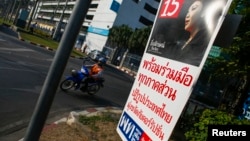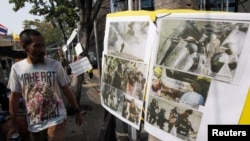BANGKOK —
Thailand's election commission says it will go ahead with nationwide elections on February 2, despite worries over security as anti-government protestors vow to shut-down Bangkok starting January 13.
The commission held talks with key political parties, including the governing Pheu Thai Party and opposition Democrat Party, which is boycotting the vote, before it made its announcement.
While anti-government protesters succeeded in largely blocking candidates registering in southern provinces, a stronghold of the opposition Democrat Party, elsewhere a total of 642 candidates applied to contest the poll.
The election commission says the 123 candidates who were unable to register because they were blocked by protesters must petition the Supreme Court to be included on the ballots.
Prasaeng Mongkonsiri, an advisor to the Democratic Force Party, one of 50 parties on the ballot, thinks the election commission is right to go ahead. Following the tumultuous political events of the past months, Prasaeng said the governing Pheu Thai may be forced into a coalition government.
"The best way is continuing the election," Mongkonsiri said. "We should go through the election and don't worry about the result of the election. Probably Pheu Thai Party might not be the first runner. It's possible medium [sized] party might be the first runner of this election."
Anti-government protesters have been demanding that the vote be delayed, that Prime Minister Yingluck Shinawatra step aside, and that a new non-elected council be appointed to make political reforms. Yingluck has refused to step down, but has said a reform council could be set up following the February vote.
The anti-government protest movement led by a former lawmaker, Suthep Thangsuban, said it plans to shutdown key areas of the capital, Bangkok from January 13 in its bid to force the government to resign.
But pro-government supporters, led by the United Democratic Front Against Dictatorship, also known as Red Shirts, say they will go ahead with counter demonstrations, leading to fears of clashes.
Friday, the head of the Thailand's National Security Council said Thai Armed forces are willing to step in to assist Thai police to ensure peace and order in Bangkok.
Titipol Phakdeewanich, a political scientist at the University of Ubon Ratchathani, in the north east, said there is support for the election, including from some supporters of the Democrat Party led by Abhisit Vejajjiva, who wish to protect their voting rights.
"It's quite surprising to hear that those who are supporting [Democrat Party leader] Abhisit also want to go to the polls on the second [of February]," he said. "But the reason that they want to go is because they want to protect their rights - so they will vote 'no.'"
Thailand’s political unrest began late last year when the government proposed a far-reaching amnesty bill that could have paved the way for the return of exiled former Prime Minister Thaksin Shinawatra. The bill failed to pass, but sparked a wave of protests in Bangkok that caused the prime minister to dissolve the government and call for early elections.
The commission held talks with key political parties, including the governing Pheu Thai Party and opposition Democrat Party, which is boycotting the vote, before it made its announcement.
While anti-government protesters succeeded in largely blocking candidates registering in southern provinces, a stronghold of the opposition Democrat Party, elsewhere a total of 642 candidates applied to contest the poll.
The election commission says the 123 candidates who were unable to register because they were blocked by protesters must petition the Supreme Court to be included on the ballots.
Prasaeng Mongkonsiri, an advisor to the Democratic Force Party, one of 50 parties on the ballot, thinks the election commission is right to go ahead. Following the tumultuous political events of the past months, Prasaeng said the governing Pheu Thai may be forced into a coalition government.
"The best way is continuing the election," Mongkonsiri said. "We should go through the election and don't worry about the result of the election. Probably Pheu Thai Party might not be the first runner. It's possible medium [sized] party might be the first runner of this election."
Anti-government protesters have been demanding that the vote be delayed, that Prime Minister Yingluck Shinawatra step aside, and that a new non-elected council be appointed to make political reforms. Yingluck has refused to step down, but has said a reform council could be set up following the February vote.
The anti-government protest movement led by a former lawmaker, Suthep Thangsuban, said it plans to shutdown key areas of the capital, Bangkok from January 13 in its bid to force the government to resign.
But pro-government supporters, led by the United Democratic Front Against Dictatorship, also known as Red Shirts, say they will go ahead with counter demonstrations, leading to fears of clashes.
Friday, the head of the Thailand's National Security Council said Thai Armed forces are willing to step in to assist Thai police to ensure peace and order in Bangkok.
Titipol Phakdeewanich, a political scientist at the University of Ubon Ratchathani, in the north east, said there is support for the election, including from some supporters of the Democrat Party led by Abhisit Vejajjiva, who wish to protect their voting rights.
"It's quite surprising to hear that those who are supporting [Democrat Party leader] Abhisit also want to go to the polls on the second [of February]," he said. "But the reason that they want to go is because they want to protect their rights - so they will vote 'no.'"
Thailand’s political unrest began late last year when the government proposed a far-reaching amnesty bill that could have paved the way for the return of exiled former Prime Minister Thaksin Shinawatra. The bill failed to pass, but sparked a wave of protests in Bangkok that caused the prime minister to dissolve the government and call for early elections.












